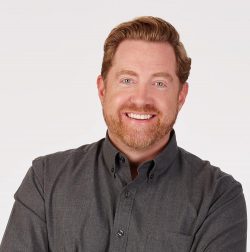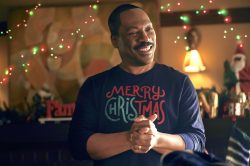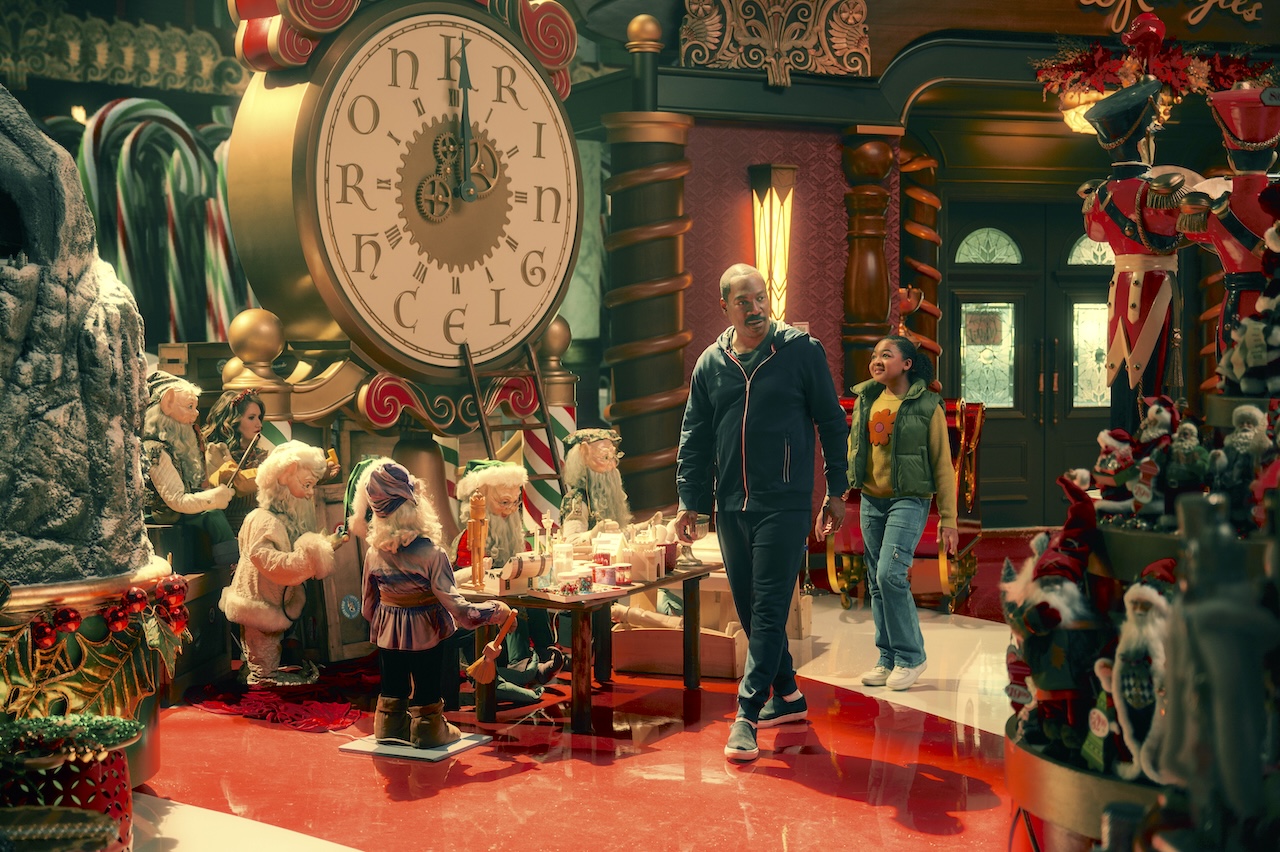“The origin story feels pretty far away from where I am now,” says screenwriter Kelly Younger. “I started out in archeology. Truth be told, I wanted to be a Goonie,” he jokes. “I’m from a working class Irish family. My family went through a hard financial time. We actually lost our house when I was a kid.”
“In The Goonies, the kids are about to lose their homes, but then they find this treasure map, fight criminals, there’s pirate ships, but ultimately they find the treasure that is going to save the family home. That movie really hit me at a pretty important moment.”
“Then, when Indiana Jones came out, I wanted to be an archeologist. That was always my interest and fascination. Lost civilizations and treasures. The kind of magic surrounding those kinds of stories. I was also a bit of a theater kid in middle school and high school. When it came time for school, I studied English Literature and the Classics.”
Eventually, it became obvious that Younger was making career choices based on movies. “Ultimately, I moved to Ireland and studied literature, drama, folk tales, mythology, and fairy tales. I started out as a student of storytelling, but then my theater background kicked in and I started writing plays — mostly because I was broke. I wrote a play and won 1,000 pounds and got involved in the Dublin Theater Festival.”
Eventually, this lead the screenwriter to Disney Animation where he worked as part of the Story Trust, providing feedback and advice for Moana, Cars 3, Coco, Incredibles 2, Ralph Breaks the Internet, Toy Story 4, Frozen II, Onward, Aladdin, and Raya and the Last Dragon.

Kelly Younger
As a screenwriter, Younger has credits on Muppets Now, Muppets Haunted Mansion, and the new Eddie Murphy comedy Candy Cane Lane. The story follows a man who is determined to win the neighborhood’s annual Christmas decorating contest until he makes a pact with an Elf who casts a spell on him which brings the 12 days of Christmas to life, and wreaks havoc on the town.
Voice = Truth
“What is the true story that you want to tell? What is the story that you really have to get out there into the world? It doesn’t have to be true in the sense of autobiographical, but what is the world that you experience? The world that you see? That’s all I think it means when someone talks about the writer’s voice. Voice is just someone courageous enough to tell their own truth.”
Younger believes this idea has led to much of his success, but it’s also advice he shares for all writers. “The endurance part comes from trying your best to write something meaningful and personal to you. That’s the best way for others to find your work and connect to it.”
When Younger has this theme or idea in mind, it’s time to do research. “I’m a big believer in research. It’s something I learned at my time with the Story Trust and the Brian Trust as Disney and Pixar. It’s just research, research, research. You write what you know, but you also write what you want to know, the things you are curious about.”
This might mean looking back at classic fairy tales for structural references to shape modern stories. “When I was working on Ralph Breaks the Internet, we were stuck on a story point. I realized it was really Hansel and Gretel. Ralph and Vanellope don’t get lost in the woods, but they get lost in the Internet.”
“Sometimes it’s helpful to remind yourself, that when you’re in the weeds, you’re overwriting and overthinking, you can turn to fairytales. They’re so simple, so short, so universal. They cut right to the core of the character and what they want. I try to remind myself that I’m not the first one to do this. There’s got to be a way out of the woods.”
The Disney Formula
Looking back on fairy tales, however, needs modern updates. For starters, most fairytales are much harsher than the Disney adaptations make them out to be. “One thing about my time there, there’s a long tradition of sanitizing fairy tales and childhood stories. They’re literally Grimm, which is where we get the Brothers Grimm from. They’re violent. Children get eaten. These delicious, awful things happen.”
“There’s been a lot of controversy in the field when we look at movies and YA books that clean them up or sanitize them. There’s this adult fear that children will be too scared from these things, that we’ll give kids nightmares. But in reality, they help children. They help adults too. They help [readers] deal with anxiety, fears, doubts, and aggressions — all of these complex emotions — in an adolescent way and ultimately an adult way.”
In one example, Younger mentions The Three Little Pigs, which is one of his favorite tales. “In the Disney version, the wolf runs away. In the original, the surviving pig cooks and eats the wolf. The wolf ate his other two siblings, so there’s this idea of becoming whole. It’s violent and gruesome, but what’s more violent for a child, that the wolf gets eaten or that the wolf is still out there and can come back? We try to protect kids from darker sides, but we all have darker sides and we need to learn how to deal with them.”
There’s a reason these stories have been around for thousands of years. They’re memorable, visually descriptive, and provide a tale of morality. “Nobody could write a thematic statement better than Aesop. This is what this is about. Before I start to write, I need to know what this story is about. I don’t need the solution, or every obstacle, but I need to know what the story is about. What is the true statement that I’m trying to share with somebody?”
“In every scene I want that to be a part of it in a subtle way. It’s the thing I’m working towards, the thing I want my hero to learn, the things I’m trying to learn. The reason those stories survive for so many generations is because they can be really culturally specific, historically specific, and where we feel the connection is with a simple universal truth that we still feel [today] because we’re human.”
Crafting The Muppets
When Younger got the chance to write for The Muppets, he actually showed the studios a photograph of him from the first grade where he performed with Animal on stage. “I lip-synced with him to ‘Mahna Mahna.’ That was about the extent of my talent as a six year old. I also feel like watching the Muppet show as a young kid made me fall in love with the theater. I loved the backstage antics.”
“My personal connection is that they’re all weird and crazy. They’re not all talented, but they work really hard and they just want to put on a good show. They’ve got each other’s backs, they’ll screw up a lot, but they love each other and the show must go on. When I started writing for them, I felt connected for those reasons, but with the stories we were working on, I wanted to bring in personal stories I had experienced with my family.”
In Muppets Haunted Mansion, as an example, the story is really about “Gonzo needing to remember how important his friendships are.” Younger adds, “As you get older, it’s easier to let friendships go away. You don’t call as often as you should. You don’t take time to meet for coffee. It’s amazing how quickly you can let friendships slide if you’re not tending to them.”
This is essentially the opposite of writers who are chasing the market. “I had to learn this lesson,” says Younger. “When I first got representation and was trying to figure out what I was going to do, I chased the market. ‘Zombies are the ‘it’ thing. We’re going to send you out on horror scripts.’ I would try, but I didn’t like horror movies. I don’t watch horror movies. I really have trouble watching them, so how could I write a good one?”
“Writers have a fear of being pigeonholed, but it’s okay to pick a lane. You can always change lanes. For me, once I had a moment and realized my lane is family — I love movies about family, watching movies with my family — what I’m drawn to has a sense of home involved. Save a home or bring everybody back home. I can’t escape that. I’m definitely in that PG lane and I love it here. The appetite will come back to your lane and you’re there and you’re ready. It takes patience and hope that if you just keep going, eventually the market will come to you.”
Candy Cane Lane
Within this lane is Candy Cane Lane, the latest Christmas comedy for Amazon. “Even though there are fantastic creatures, it’s based on a real story. There’s a town in El Segundo, California. It’s a quirky beach town, nestled between LAX, the Chevron refinery and the water treatment plant.” Younger’s parents moved to this area and discovered they went all out for Christmas. “They’ve dubbed it Candy Cane Lane since the 1940s.”
Basically, every house in the suburb is a Clark Griswold sort of house. “My parents’ house is at the top of that same street. My dad, who is a truck driver by trade, but he should have been an artist. He’s a wood worker who constantly makes things. When he found out this neighborhood goes all out for Christmas, he wanted in on the action.”
Younger’s Dad built a variety of handcrafted wooden Christmas ornaments for the front yard, so much so, that his yard got featured in the local paper. “The controversy was that he was sort of like a block up from the official lane, so there was some tension to say the least. I thought, how funny that this area that goes all out for the holidays might be more like Game of Thrones with politics and rivalries.”

Chris Carver (Eddie Murphy), Photo by Claudette Barius
The screenwriter takes his kids there every year as the lane continues to grow. “I always wanted to write a Christmas movie and I knew if I did it would be set in Candy Cane Lane. I do try to start in a way that’s the most grounded. Who is our hero? What’s their problem? What do they want? What’s going to happen if they don’t get it? Why is this happening right now? What’s the reality for this character? I start grounded, but then I want a bit of magic, either the supernatural or the charmed.”
A Sense of Wonder
“For myself, I think, keep them wondering. Not guessing, but a sense of wonder in every scene. Highlight the charm, the magic, and the joy. Make something wonderful. That’s what I try to do. But then I want to add magic, but I want the magic to come from within, rather than feel like it’s placed on top of it. The magic should come from something that is flawed or broken within the character, so it doesn’t feel artificial or tacked on. It should feel like it’s coming from the problem.”
Younger also didn’t want to write one of the two most common Christmas movies, where A. a stranger comes to town and meets a lumberjack or B. something similar to Charles Dickens’ A Christmas Carol. “I really wanted to do something original, something where I had to make up the mythology and make up the rules. It’s easier to rely on a template, but I knew I wanted something original and personal. Most Christmas movies also have snow, but I didn’t grow up with snow. I grew up with a boogie board, not a sled.”
In terms of advice for writers who want to write family stories, the screenwriter would tell you to look at your own family. “Sometimes doubt sets in that anyone outside your family would be interested in your family. We all have family stories, legends, and you wonder if it’s interesting. Or fear sets in to air your dirty laundry. I think, if you are interested in writing about your family, the number one thing to do is muster the courage to do so and do so in an honest way. That’s the great hurdle to overcome.”
This interview has been condensed. Listen to the full audio version here.

